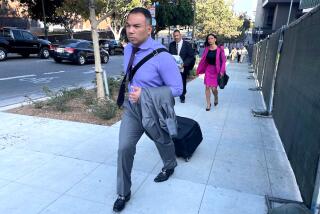2 Latino gang members sentenced in Compton racial attack
Two Latino gang members were sentenced Monday to 21 months in prison after pleading guilty to charges stemming from racially motivated attacks against African Americans in Compton in December 2012.
But in an unusual turn of events, U.S. District Judge Terry J. Hatter Jr. said he believed the attacks on a black teen and his girlfriend’s family by Jeffrey “Terco” Aguilar, 20, and Efren “Stretch” Marquez, 22, were primarily gang-related and included derogatory remarks.
“Race certainly factored into it, but it is primarily a gang case,” Hatter said, adding that his conclusion does not detract from the crime’s serious nature.
Both defendants could have received 10 years in prison. However, Hatter chose to give Aguilar 21 months in federal prison, three years’ supervised probation and six months in a halfway house. Marquez, who had no previous criminal record, received 21 months in federal prison and three years’ supervised probation. Both are forbidden from being with members of the Compton 155 gang.
With credit for time served of a year, they will be out of prison within the year.
“I know I did wrong, and I regret it,” Aguilar told the judge before sentencing.
Hatter, who is African American, acknowledged that Aguilar grew up without parents and got into trouble as a young teenager, but the 20-year-old, despite not finishing high school, “was a bright young man,” he said.
The sentence came after a federal public defender’s investigator testified that a victim told him during a recent interview the fight was gang-motivated, not racial. The victim told the investigator he believed the fight started because he was wearing blue, and the assailants assumed he had a gang affiliation.
Samuel Josephs, Aguilar’s assistant federal public defender, told the judge it was a basic gang crime that left one victim with a bump on the head that was blown out of proportion by authorities.
Assistant U.S. Atty. Reema El-Amamy, however, said, “There is no evidence they were attacked for anything but race.” She noted that the victims had no gang affiliations, threw no gang signs or said anything to lead the assailants to believe they were gang members before the attack.
The case marked the first convictions in the Los Angeles region under a federal law that criminalized violent acts based on race, religion, national origin, sexual orientation or gender.
More to Read
Sign up for Essential California
The most important California stories and recommendations in your inbox every morning.
You may occasionally receive promotional content from the Los Angeles Times.











